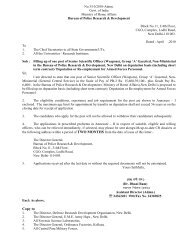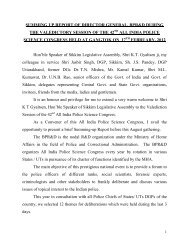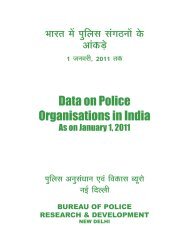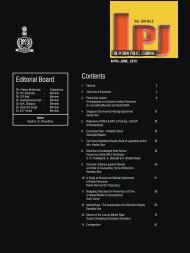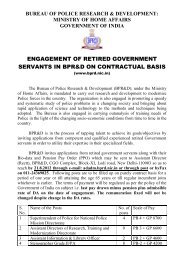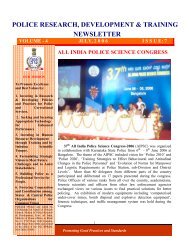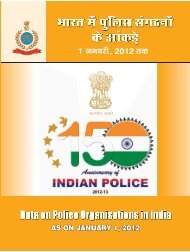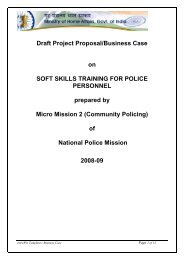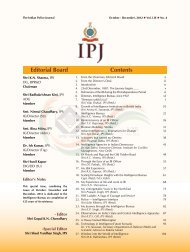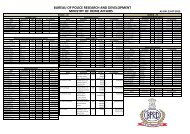SUPREME COURT & HIGHCOURT Rulings on POLICE
SUPREME COURT & HIGHCOURT Rulings on POLICE
SUPREME COURT & HIGHCOURT Rulings on POLICE
Create successful ePaper yourself
Turn your PDF publications into a flip-book with our unique Google optimized e-Paper software.
INTRODUCTORY NOTE<br />
<strong>POLICE</strong> AND THE JUDICIAL PROCESS<br />
As a key agency of the Criminal Justice administrati<strong>on</strong> the Police is<br />
resp<strong>on</strong>sible for performing multi-faceted functi<strong>on</strong>s such' as' the preventi<strong>on</strong><br />
of crime, maintenance of law and order, c<strong>on</strong>duct of investigati<strong>on</strong> of crimes,<br />
producti<strong>on</strong> of undertrials before the Courts and post sentence survillence<br />
over the criminals: etc. In view of the functi<strong>on</strong>al' peculiarities the Police<br />
tends to become the fr<strong>on</strong>tal' formal agency to come in c<strong>on</strong>tact, with the raw<br />
realities a/crime including the accused and the victims. All this makes the<br />
Police not <strong>on</strong>ly an all pervasive criminal justice agency but also exposes it<br />
to frequent social censures both of formal as well as informal nature, and<br />
makes them the centre of lot of c<strong>on</strong>troversies regarding their professi<strong>on</strong>al<br />
roles.<br />
In a Rule of Law society the Police, like the other criminal justice agencies,<br />
functi<strong>on</strong>s within the legal framework of the C<strong>on</strong>stituti<strong>on</strong>al and the Municipal<br />
Laws that comprise mainly of the C<strong>on</strong>stituti<strong>on</strong> of India, 1950, The Code of<br />
criminal Procedure, 1973, the Indian Evidence Act, 1872, the Protecti<strong>on</strong> of<br />
Human Rights Act, 1993 and the Police Act etc. Though the vide range of<br />
statutory laws c<strong>on</strong>stitute, the normative basis for the Police functi<strong>on</strong>s, but at<br />
the actual functi<strong>on</strong>al level, often' doubts and c<strong>on</strong>troversies arise, regarding<br />
the, ambit and interpretati<strong>on</strong>s of the statutory rules, thereby calling for<br />
frequent adjudicati<strong>on</strong>s by the courts. In the traditi<strong>on</strong> of the Theory of<br />
Precedent the judgments of the appellate, courts have a binding or<br />
persuasive value for the later decisi<strong>on</strong>s <strong>on</strong> the point. Particularly the<br />
"judgments of the Supreme Court of India which are accorded the highest




